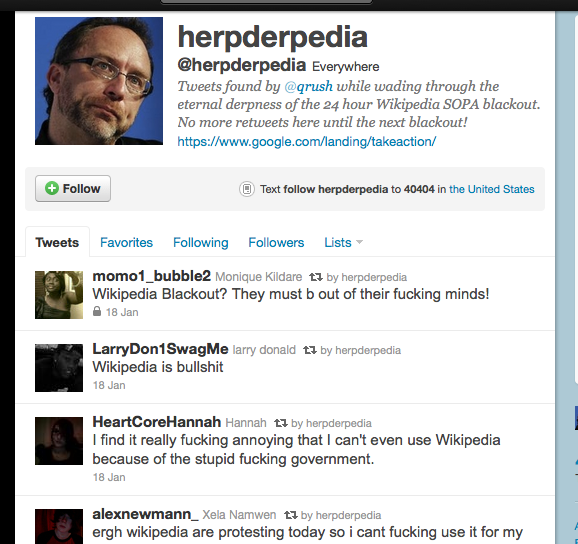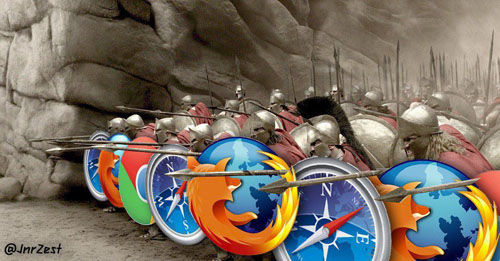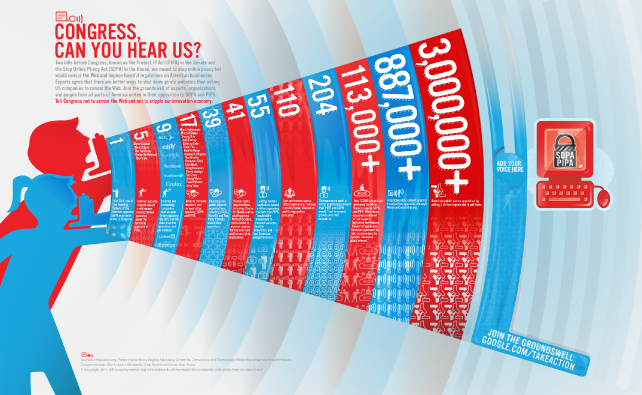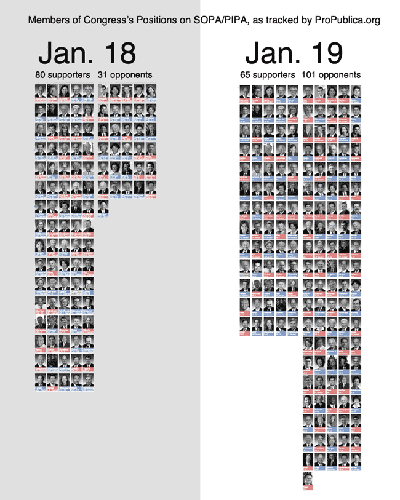
Image Credit: Wikipedia
If you didn't see this image last week, you may have been hiding under a rock. Wikipedia reports that 162 million people viewed this image on January 18 as a result of their protest of the Stop Online Piracy Act and the Protect IP Act, which involved blocking all English-language content on the website. As a result of the blackout, 8 million people looked up their representatives in Congress, and a unknown number of people tweeted amusing and seeemingly illiterate things. (Mildly NSFW content in full post.)

Image Credit: Twitter
One collection of these amusing tweets can be found at herpderpedia, where one can read tweeted criticisms of the Wikipedia blackout, many of which profess to know absolutely nothing about the reasons behind the protest, even though users have just visited the site, which explained the reasoning behind blocking content. If one thing is clear from all these tweets, it's that students don't know how to function without Wikipedia. And, I confess, it was a tough day for me, too. There are just so many things to look up!
Criticisms of online protests by Wikipedia and other major websites like Google and Reddit were not just limited to the herpderps of high school and college students trying to complete their homework. A particularly nasty editorial from the Boston Herald describes the protests as a "hissy fit" that would only effect college students who should really be doing their research elsewhere. The Herald is among a reduced number of papers that still supports SOPA, that reduction being a direct result of internet protests.

Image Credit: caffpowered via reddit.com
And, as is usually the case when the internet gets something done, those involved were pretty proud of themselves. One Reddit user celebrated the sea change with this Photoshopped image of a still from 300 (making the image an adaptation of an adaptation of an adaptation), which likens himself and other users to a few Spartans defending their homeland against invasion by a vast number of evil forces. While from the outside, the image may seem pretentious (you might notice that the shields, made from web browser logos, exclude Internet Explorer, which only a rube would use), the celebration and self-congratulation are not unfounded.

Image Credit: Google
This infographic from Google shows how the internet response triggered mass protest in the forms of 887,000 telephone calls to Congress and telephone and 3,000,000 signatures on anti-SOPA and anti-PIPA petitions, and this image is a few days old already. Opposition to the bill is credited to the availability of information on the internet, and many news sources and protest websites credit their actions with educating the American public about SOPA and PIPA, even if herpderpedia shows that many Americans still did not understand the protests.

Image Credit: ProPublica.org
The most telling image comes from ProPublica, a non-profit internet news publication that won the Pulitzer Prize for National Reporting in 2011, the first time that a non-print publication won. The infographic details who supported and opposed SOPA and PIPA prior to and following the January 18th protest, showing just how effective the January 18 actions were.





Recent comments
2 years 29 weeks ago
2 years 44 weeks ago
2 years 44 weeks ago
2 years 50 weeks ago
3 years 4 weeks ago
3 years 4 weeks ago
3 years 4 weeks ago
3 years 6 weeks ago
3 years 6 weeks ago
3 years 6 weeks ago